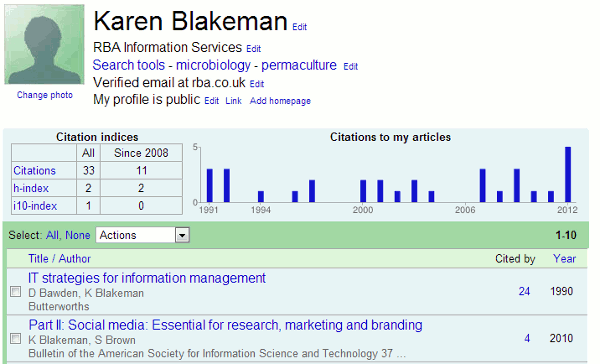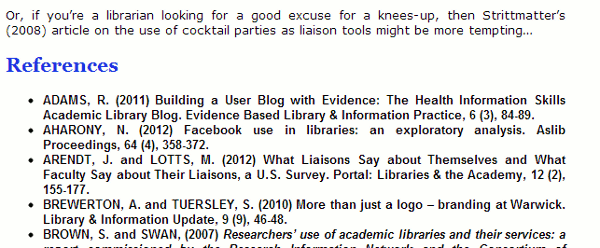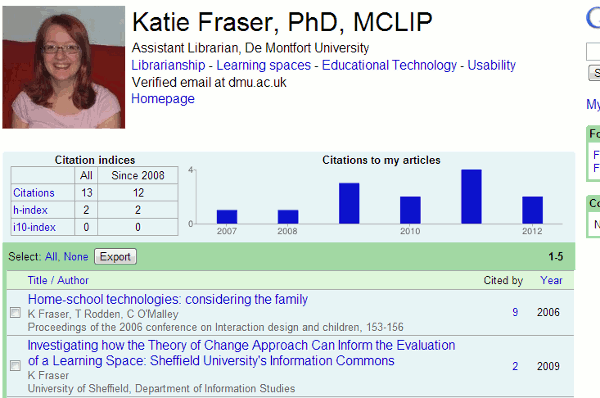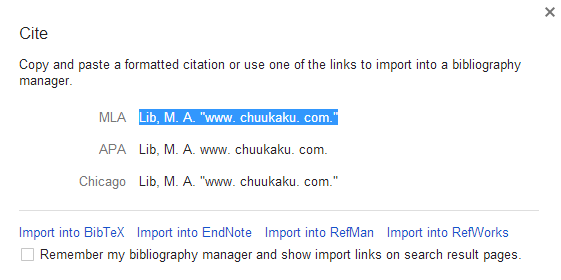Eight months after setting up my Google Scholar author profile and “claiming” my papers I have received my first alert. If you only use Google Scholar (http://scholar.google.com/) to search for papers you may not be aware that if you have published papers you can set up a Google Scholar author profile and add those papers to your profile. Google then creates a page showing a graph of when and how often your papers were cited and generates an H-index and i10-index for you.

This only covers the papers that Google Scholar has in its database and there are serious gaps in its coverage for some sectors. On the other hand, it does sometimes include articles, web sites and blog postings that are not peer reviewed in the conventional way. This can be a good thing because it may pick up some very useful grey literature. It can be a bad thing because it is possible to fool Scholar into adding a paper of dubious quality by mimicking the structure of an academic paper – title and author names in large font, affiliation, abstract, keywords, list of references etc.
Another feature of Scholar is that you can create alerts for keyword searches, new papers by an author or new citations to their articles. Needless to say I have set up alerts on my own name! Sadly, until last week I had received nothing so had to assume that no-one was interested in or citing my papers. Or perhaps the alerts do not work? Whatever the reason, I was delighted that at last someone had mentioned me in some way in an article. Clicking through to the item, though, led me to Katie Fraser’s blog and “Communicating with postgraduate research students: some themes from the library literature” (http://www.chuukaku.com/blog/2013/01/communication-with-pgr.html). Was I mentioned or cited in the posting? No, but my own blog was listed in her blogroll to the left of the article.
Having got over the disappointment I turned my attention to working out why Scholar had picked up this particular post. Why wasn’t I receiving alerts every time Katie updated her blog? The answer appears to be at the end of the posting in question: Katie has provided a list of references.

Another factor, I thought, might be that Katie has an author profile and claimed her papers but I could not see it anywhere in her profile.

On further investigation, and unfortunately for Katie, Google Scholar is unaware that she is the author of this article. It appears that it is someone called MA Lib.

This was confirmed when I clicked on the ‘Cite’ option. This presents you with formatted citations that you can cut and paste into an article or import into a bibliography manager. The author is definitely MA Lib.

Google Scholar has failed to recognise Katie Fraser as the author and has decided that the MA Lib link in the side menu of her blog is a person’s name. There are many similar examples and it is well known that Scholar is unreliable when it comes to identifying authors. Peter Jacso has written several articles detailing Scholar’s shortcomings in this area. (1, 2, 3, 4). Many of his articles are available as pre-prints (5)
What this means for Katie is that although Google Scholar believes her blog posting (6) is worthy of inclusion in its database it is not listed in her author profile and does not contribute towards her h or i10-index. And in case you are wondering, yes I have appended references to this posting to see if Google regards it as scholarly literature and adds it to the Scholar database
Update: Katie Fraser has now “claimed” the posting for her profile but the Google Scholar database has not yet been updated to reflect this.
References
(1) Jacsó, Péter. “Metadata mega mess in Google Scholar.” Online Information Review 34.1 (2010): 175-191.
(2) Jacsó, Péter. Newswire Analysis: Google Scholar’s Ghost Authors, Lost Authors, and Other Problems [Online] 24 September 2009 [Accessed 4 February 2013.] http://www.libraryjournal.com/article/CA6698580.html
(3) Jacsó, Péter. “Google Scholar Author Citation Tracker: is it too little, too late? “Online Information Review 36.1 (2012): 126-141.
(4) Jacsó, Péter. “Using Google Scholar for journal impact factors and the h-index in nationwide publishing assessments in academia–siren songs and air-raid sirens.” Online Information Review 36.3 (2012): 462-478.
(5) Jacso – Savvy Searching Columns, Online Information Review http://www2.hawaii.edu/~jacso/savvy-mcb.htm [Accessed 4 February 2013]
(6) Lib, M. A. “www.chuukaku.com.”
Wow, I really didn’t think Google Scholar was that inclusive in what it picked up! This will make a brilliant anecdote to discuss when discussing the strengths and weaknesses of Google Scholar with postgrad students…
I’m going to pop and see if I can claim it back…